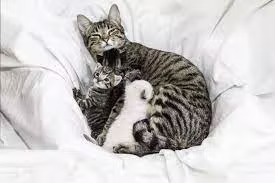Handling Situations Where a Mother Cat Cannot Nurse Her Kittens

Author: Vejay Anand
Introduction:
Once your cat has given birth to a litter of kittens, it's expected that she will care for them without much human intervention. However, there are situations where a mother cat may struggle to nurse her kittens, be it due to rejection, health issues, or other complications. In such cases, it's essential to understand why this is happening and what you can do to ensure the kittens' well-being.
Understanding Reasons Behind a Mother Cat's Nursing Challenges:
Mother cats may encounter various obstacles when it comes to nursing their kittens. These challenges include the mother cat not nursing at all, refusing particular kittens, or struggling with the demands of a large litter. The reasons behind these challenges can range from health issues in the mother cat, the kittens' condition, and even the mother's age.
Health Problems in the Mother Cat:
A mother cat facing health problems may be unable to provide sufficient milk for her kittens. Health issues, such as mastitis, dehydration, or malnourishment, can hinder her ability to nurse effectively. It's vital to ensure that the mother cat has access to nutrient-rich cat food during her pregnancy and nursing period.
Sick or Deformed Kittens:
The mother cat might sense health problems in specific kittens and reject or neglect them to protect the rest of the litter. This can occur if a kitten has congenital abnormalities, significant illnesses, or other subtle issues. Consult your veterinarian to address the situation and adequately care for the affected kittens.
Large Litters and Competition:
In the case of enormous litter, mother cats may struggle to nurse all kittens simultaneously, causing particular kittens to be outcompeted or neglected. In such instances, bottle-feeding, reducing nursing frequency, or separating minor kittens may be necessary.
Immature Mother Cats:
Young mother cats may lack the energy reserves to meet the demands of nursing if they are still growing. If you have a young mother cat with kittens facing nursing difficulties, it's crucial to seek veterinary advice and offer additional support.
Bottle Feeding and Caring for Kittens:
When the mother cat cannot nurse her kittens, bottle-feeding with a proper kitten formula, like KMR (kitten milk replacer), is essential. It's crucial to follow a feeding schedule, keeping the kittens warm and assisting with urination and defecation after each feeding. Consult your veterinarian for guidance on feeding amounts and weight monitoring as the kittens grow.
Post-Veterinary Visit Care:
After consulting with your veterinarian, prepare for the coming weeks by identifying the kittens individually, either through collars or other methods, to monitor their feeding, health, and development. Kittens will typically require kitten milk for the first four weeks, gradually introducing canned kitten food around three weeks. Always prioritize your veterinarian's advice on proper kitten care.
Conclusion:
In cases where a mother cat cannot nurse her kittens, understanding the root causes and seeking timely veterinary care is crucial. Your proactive intervention ensures the well-being and healthy development of the kittens, making this a valuable part of responsible cat ownership.

